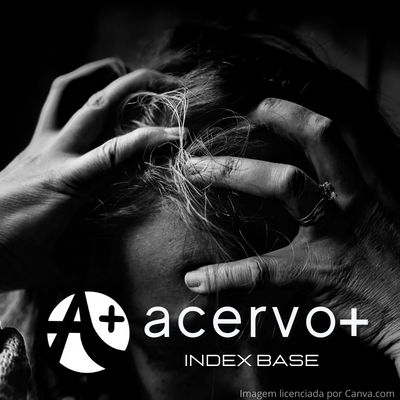Depressão pós-parto e psicose puerperal: uma revisão de literatura
##plugins.themes.bootstrap3.article.main##
Resumo
Objetivo: Expor os conceitos básicos sobre a depressão pós-parto e psicose puerperal, ressaltando a história natural da doença e possíveis consequências para o binômio mãe-criança. Revisão bibliográfica: Existem vários fatores de risco para a depressão pós-parto: história pessoal de depressão pré-natal, renda familiar baixa e má relação conjugal. No que se refere à psicose puerperal, tem-se como principais fatores de risco: história pessoal ou familiar de transtorno bipolar e psicose pós-parto em uma gestação anterior. O diagnóstico de depressão pós-parto pode acarretar algumas consequências para o bebê, como baixo peso, diarreia, cólicas, dor durante a rotina de vacinação e doença febril na criança. A psicose puerperal pode afetar diretamente na segurança da mãe e do bebê, visto que a mulher diagnosticada tem tendência ao suicídio, comportamento hostil e prejudicial com a criança. A abordagem acerca destas patologias precisa ser multidisciplinar. A intervenção farmacológica está reservada aos casos graves. Considerações finais: A depressão pós-parto e a psicose puerperal são patologias psiquiátricas que podem acometer mulheres no período do puerpério. Nesse período, ocorrem alterações tanto de caráter emocional como hormonal, potencializadas por diversos fatores. Resultados indicam que essas patologias podem levar a um padrão negativo de interação com o bebê.
##plugins.themes.bootstrap3.article.details##
Copyright © | Todos os direitos reservados.
A revista detém os direitos autorais exclusivos de publicação deste artigo nos termos da lei 9610/98.
Reprodução parcial
É livre o uso de partes do texto, figuras e questionário do artigo, sendo obrigatória a citação dos autores e revista.
Reprodução total
É expressamente proibida, devendo ser autorizada pela revista.
Referências
2. BIDER EN, COKER JL. Postpartum psychosis and SARS-CoV-2 infection: is there a correlation? Arch Womens Ment Health, 2021; 24(6): 1051-1054.
3. BØTTCHER KSE, et al. Post-partum psychosis. Ugeskr Laeger, 2021; 183: V01210020.
4. CERNADAS JMC. Postpartum depression: risks and early detection. Arch Argent Pediatr, 2020; 118(3): 154-155.
5. CHEN Q, et al. Prevalence and risk factors associated with postpartum depression during the COVID-19 pandemic: a literature review and meta-analysis. Int J Environ Res Public Health, 2022; 19(4): 2219.
6. DAVIES C, et al. Prenatal and perinatal risk and protective factors for psychosis: a systematic review and meta-analysis. The Lancet Psychiatry, 2020; 7(5): 399-410.
7. DENNIS CL, et al. Prevalence of antenatal and postnatal anxiety: systematic review and meta-analysis. Br J Psychiatry, 2017; 210(5): 315-323.
8. DUKO B, et al. The epidemiology of postnatal depression in Ethiopia: a systematic review and meta-analysis. Reprod Health, 2020; 17(1): 180.
9. FIALA A, et al. Sociodemographic and delivery risk factors for developing postpartum depression in a sample of 3233 mothers from the Czech ELSPAC study. BMC Psychiatry, 2017; 17: 1-10.
10. FORDE R, et al. Recovery from postpartum psychosis: a systematic review and metasynthesis of women‘s and families‘ experiences. Arch Womens Ment Health, 2020; 23(05): 597-612.
11. GUO L, et al. Preventing Postpartum Depression With Mindful Self-Compassion Intervention: a randomized control study. J Nerv Ment Dis, 2019; 208(2): 101-107.
12. HOLFORD N, et al. The impact of postpartum psychosis on partners. BMC Pregnancy Childbirth, 2018; 18(1): 1-10.
13. ISLAM JM, et al. Early exclusive breastfeeding cessation and postpartum depression: Assessing the mediating and moderating role of maternal stress and social support. PloS One, 2021; 16 (5): e0251419.
14. KALRA H, et al. Burden of severe maternal peripartum mental disorders in low- and middle-income countries: a systematic review. Arch Womens Ment Health, 2022; 25(02): 267-275.
15. KORTELAND TW, et al. Nursing interventions for patients with postpartum psychosis hospitalized in a psychiatric mother–baby unit: a qualitative study. J Psychiatr Ment Health Nurs, 2019; 26: 254-264.
16. LEWIS G, et al. Delusional Misidentification Syndromes in Postpartum Psychosis: A Systematic Review. Psychopathology, 2022; 1-10.
17. MALHI G, et al. The 2020 Royal Australian and New Zealand College of Psychiatrists clinical practice guidelines for mood disorders. Aust N Z J Psychiatry, 2021; 55:7.
18. MCKEAN M, et al. Postpartum Depression: when should health care providers identify those at risk?. Clin Pediatric, 2018; 57(6): 689-693.
19. OZKAN S, et al. The effectiveness of an exercise intervention in reducing the severity of postpartum depression: a randomized controlled trial. Perspect Psychiatr Care, 2020; 56(4): 844-850.
20. PAYNE JL, MAGUIRE J. Pathophysiological mechanisms implicated in postpartum depression. Front Neuroendocrinol, 2019; 52: 165-180.
21. PRANDINI NR, et al. Health of Postpartum Women During the COVID-19 Pandemic: An Integrative Review. Aquichan. 2022; 22(2): e2227.
22. RODRIGUEZ-CABEZAS L, CLARK C. Psychiatric emergencies in pregnancy and postpartum. Clin Obstet Gynecol, 2018; 61(3): 615-627.
23. SANTOS MLC, et al. Sintomas de depressão pós-parto e sua associação com as características socioeconômicas e de apoio social. Escola Anna Nery [online], 2022; 26: e20210265.
24. SLOMIAN J, et al. Consequences of maternal postpartum depression: a systematic review of maternal and infant outcomes. Women’s Health, 2019; 15(1): 1–55.
25. SPINELLI M. Postpartum psychosis: a diagnosis for the DSMV. Arch Womens Ment Health, 2021; 24(5): 817-822.
26. STEWART DE, VIGOD SN. Postpartum Depression: Pathophysiology, Treatment, and Emerging Therapeutics. Annu Rev Med, 2019; 70: 183-196.
27. TINKLEMAN A, et al. Management of New Onset Psychosis in the Postpartum Period. JClin Psychiatry, 2017; 78(9): 1423-1424.
28. UPADHYAY RP, et al. Postpartum depression in India: a systematic review and meta-analysis. Bull World Health Organ, 2017; 95(10): 706-717C.
29. VANDERKRUIK R, et al. The global prevalence of postpartum psychosis: a systematic review. BMC Psychiatry, 2017; 17(1): 272.
30. WANG Z, et al. Mapping global prevalence of depression among postpartum women. Transl Psychiatry, 2021; 11(1): 640.
31. WEIJING Q, et al. Psychosocial risk factors for postpartum depression in Chinese women: a meta-analysis. BMC Pregnancy Childbirth, 2021; 21: 174.

